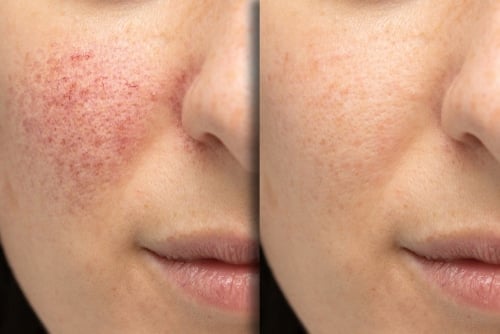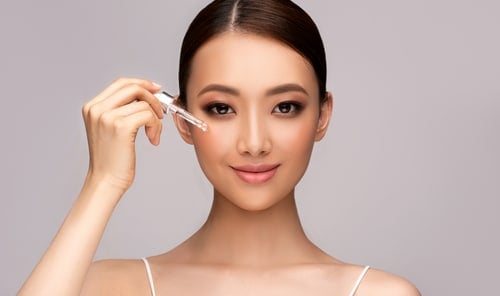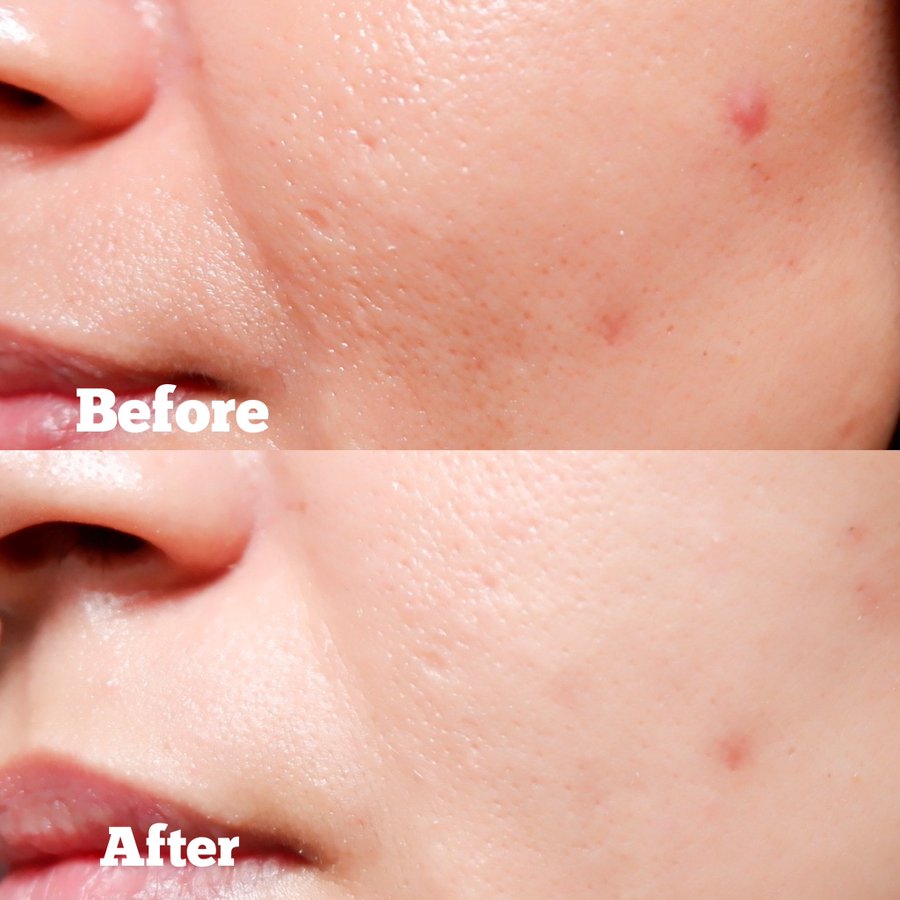Why You Won’t Find Korean Retinol Anti-Aging Skincare Products | 7 Important Facts
Are there Korean retinol skincare products? If not, are there any Korean retinol alternatives? What about Korean retinol serums and eye creams? Find out more, right here!
Retinol is renowned across the globe for it’s anti-aging properties. Yet, you’ll be hard pressed to find Korean retinol skincare products!
Wonder why that is? Let me catch you up to speed about why there are no Korean retinol products despite Korean being obsessed with skincare of all sorts.
Before I dive into the reason Korean retinol products are so rare, let’s first understand what Retinols are in the first place!
Korean Retinol
What is Retinol?

Retinol is also known as all-trans retinol. It’s a part of the retinoid family. Or in other words, it’s a chemical that belongs to a group of substances called retinoids.
This particular retinoid occurs naturally in our skin in the form of retinoic acid. It’s been an omnipresent ingredient in most anti-ageing skin care products.
Retinol helps deal with photoaging and reverses the damage caused by UV radiation on skin.
It’s, however, a precursor to retinoid acid. So your skin must absorb this substance and with the help of enzymes, convert it to retinoic acid.
Retinoic acid is super effective at reversing the signs of aging. It’s available in the form of topical ointments and even oral supplements.
It contains nuclear receptors that help make the production of skin cells more organised and boost the collagen production too. Hence, giving you firmer, smoother skin.
The retinoic acid products, however, require a prescription.
So most skincare products use a less powerful version of retinoic acid in their creams and serums. This is retinol!
Uses of Retinol For Skin

Here are some reasons why retinol is popular all over the world in anti-aging skincare products, especially serums and face creams.
- Retinol increases the proliferation of skin cells. This helps skin become smoother.
- It also boosts collagen production, making skin appear firmer.
- It also helps reduce signs of damage left by UV rays like pigmentation and dark spots
- Retinol can help control excess sebum production as well. This helps keep acne and blackheads in check.
To sum it up Retinol is a powerful anti-aging compound. So it’s used in skincare all over the world to help reduce signs of aging like wrinkles, fine lines, sagging skin, pigmentation, etc.
So you must be wondering… If retinol is so great, why aren’t there any Korean retinol products like serums or essences?
Well, here is the whole truth about the K-beauty industry’s relationship with retinol.
The most obvious reason why Korean retinol products don’t exist seems to be the volatile nature of retinol.
It’s not all smooth sailing when you start using retinol products. They tend to be harsh and can dry out the skin.
So unless you’re combining them with moisturizing ingredients like hyaluronic acid, both retinol and retinoic acid can wreak havoc on dry skin.
It also irritates sensitive skin until you get used to it.

Retinol is something your skin has to get used to. There is a significant “adjustment period” during which your skin can break out, get irritated, and appear red and flaky.
This can cause a lot of discomfort to some people and they give up on retinol mid-way.
Regular use of retinol-based products is also known to make your skin more sensitive to sunlight.
It thins out your skin, leaving it vulnerable to inflammation during the period of adjustment.
But these issues can be managed by using retinol with rich moisturizers and using a lot more SPF. Many people who swear by retinol take these measures and use retinol successfully too.
So why is it that Korean retinol skincare products are still a no-no?
Related: Best Korean Anti-Aging Skincare Products
Korean’s Trust Preventive Skin Care Products

Korean skincare is all about consistency and preventive measures.
The K-beauty industry produces several skincare items that Korean women start using from when they are still teenagers.
They maintain their skin and prevent any damage and aging from occurring in the first place. So one of the main reasons why Korean retinol products don’t exist is because they do not NEED retinol.
Retinol is a turn-back-the-clock product that repairs damaged skin and makes it younger. But for many Korean women it’s a last resort.
Here are some Korean beauty mantras that you can follow too:
Hydration: K-beauty routines focus on keeping your skin hydrated as dry skin is a precursor to aging.
There are several toners, essences, serums, and other products with humectants that help hydrate skin and prevent it from losing moisture.
Cleansing: Koreans also believe in keeping skin pure by doing double cleansing. Firstly use an oil cleanser to unclog their pores and remove any product build-up or makeup.
Then they use a hydrating face wash to keep their skin clean and soft.
SPF: Another reason why there are no Korean retinol products is because they keep their skin protected from photo damage in the first place.
Korean women religiously use sunscreen and take other measures to protect themselves from the sun.
Holistic approach: K-beauty doesn’t believe in using one product as a “fix-it-all”. They take a holistic approach to skincare.
Korean skincare doesn’t contain any harsh chemicals and is mostly filled with natural ingredients. There is also emphasis on following a routine consistently and focusing on a heathy diet.
Dermatologists Have This To Say About Retinol
To use retinol or not use retinol that is the question. So I decided to settle this matter once and for all and consulted the dermatologists on our team. And this is what I found.
Yes, retinol-based skin care products can be harsh on sensitive skin. But so are certain other ingredients like alpha-hydroxy acids (AHAs) which have a similar effect in terms of exfoliating skin.
So K-beauty’s disdain towards Korean retinol products is mostly cultural.
There aren’t many Korean retinol skincare products because they don’t particularly require them. Not because retinol is harmful to your skin.
In fact, the myth about retinol “thickening” your skin isn’t true either.
It just stimulates the production of new skin cells and removes the older, dead skin layer. This makes your face appear fresher.

Retinol also increases the collagen in your skin cells making them firmer but this doesn’t necessarily mean it thickens skin.
You can also apply retinol safely for a long period, even years! It is one of the anti-aging ingredients that works better the longer you use it.
There are certain ways you can easily manage any drawbacks of using retinol.
I suggest limiting its use in summer months as it leaves skin a bit photosensitive. And also to double down on sunscreen when venturing out in the afternoon.
It’s also a good idea to use retinol serums in addition to other hydrating skincare.
In fact, if you’re already using products from Korean skincare brands, here’s how you can incorporate retinol in your K-beauty regimen.
How You Can Use Retinol With Korean Skincare

If you really want to use retinol and feel your skin can benefit from it, here’s how you can incorporate it into your skincare routine.
- Since retinol makes your skin photosensitive I suggest using any retinol serum at night.
- If you’re starting out with retinol make sure to try out products with lower concentration. You can even start off with just using it 2-3 times a week.
- Retinol can dry out your skin. It also makes your epidermis (the topmost layer of skin) very sensitive. So you need to strengthen your skin by hydrating it often.
- I suggest using retinol with ingredients like hyaluronic acid, snail mucin, ceramides, or other moisturizing components.
- Avoid using retinol with ingredients like AHA, BHA, vitamin C, etc. as these are strong exfoliating agents and can irritate skin when used in combination with retinol.
- Give it time. Your skin needs to get used to retinol, so brave through the “purging” period.
Alternatives To Korean Retinol Skincare
Not sure about retinol? Not to worry.
If you want to get rid of your fine lines, wrinkles, and other signs of aging, but do not want to risk the effects of retinol, here are some alternatives found in Korean skincare.
Ceramides
Ceramides are a type of lipids (fats) that are found in abundant amounts in the topmost layer of the skin. These are responsible for maintaining moisture and plumpness in your skin.
With age, skin loses its concentration of ceramides, becoming dry, rough, and leathery. But there are several K-beauty products with ceramides that help undo this damage.
The most notable of these is the ceramidin range from Dr. Jart+.
Snail Mucin
Yes, I know it sounds weird. But snail mucin is one of the most potent anti-aging ingredients in the Korean beauty industry.
It is a reservoir of hyaluronic acid and contains some amount of glycolic acid too. So it naturally clears up the dead skin cells and hydrates your face.
It also contains allantoin that controls inflammation on skin. So it’s not just a good substitute for retinol, but it can also be used with retinol to counteract the side effects.

Ginseng
Ginseng or specifically Korean red ginseng is another great substitute for retinol serums. This herb is packed with antioxidants and various nourishing components like saponins, polysaccharides, pantothenic acid, pectin, sugar, vitamins B1, B2, B12, and pectin.
This helps prevent oxidative damage on your skin (damage caused by free radicals).
It helps reduce inflammation, pigmentation, puffiness, and other signs of aging.

Niacinamide
Niacinamide is nothing but a water-soluble form of vitamin B3. It’s a powerful antioxidant that helps with oxidative stress that causes aging.
It is also an excellent skin whitening agent. It helps control pigmentation and signs of aging like fine lines and wrinkles.
Vitamin C
Vitamin C has similar exfoliating properties as retinol. It also helps remove the dead skin layer on your face.
It’s also packed with antioxidants. And like niacinamide, it has both anti-aging and skin whitening properties.
Retinol Palmitate in Korean Skincare Products
I once looked at the ingredient label at one of the Korean skincare products and was surprised to see that it contained Retinol.
After some more research, I found that the product was not retinol, but in fact retinol palmitate.
This compound is a combination of retinol and palmitic acid. It’s mild and nowhere near as powerful as retinol.
Korean translations require each ingredient to be listed separately on the label, even if it’s in the form of a compound.
So sometimes, you might see the presence of retinol on the ingredients label of a cream or face wash. But most likely it’s just retinol palmitate.
Best Korean Retinol Serums And Creams

Just because retinol (or other members of the retinoid family) aren’t preferred ingredients in Korean skincare, that doesn’t mean there aren’t any Korean retinol skincare products.
In fact, due to global influence and demand, a lot of Korean skincare brands have started using retinol in their creams and serums.
Some of my favorites have to be the Yeouth Retinol Serum which has 2% retinol. This is one of the standalone retinol products so you can easily incorporate it in your skincare routine. I suggest using retinol at night because it makes your skin photosensitive and light can trigger irritation and the dreaded retinol burn which is caused by skin becoming more vulnerable to UV radiation.
Since retinol can be too powerful for the skin, I also suggest layering it with moisturizer before and after.
Another Korean skincare item containing retinol that I really enjoyed was the Laneige Retinol Eye cream. It is one of the few eye creams out there with retinol. If you’re having issues with crow’s feet or laugh lines around your eyes you should use this one.
Does Retinol Really Help Skin, And How?

Yes, retinol is a widely recognized and effective ingredient in skincare that can provide several benefits for the skin. Retinol is a derivative of vitamin A and belongs to a class of compounds known as retinoids. It has been extensively studied and used in various skincare products due to its ability to improve skin health and appearance.
Here are some of the ways retinol helps the skin:
- Stimulates Collagen Production: Retinol stimulates the production of collagen, a protein that provides structural support to the skin. Increased collagen production can help improve skin elasticity, reduce the appearance of fine lines and wrinkles, and give the skin a more youthful appearance.
- Boosts Cell Turnover: Retinol accelerates the rate of cell turnover, meaning it helps to shed old, dead skin cells and promote the growth of new skin cells. This process can lead to smoother, clearer, and more even-toned skin.
- Reduces Hyperpigmentation: Retinol can fade dark spots, sunspots, and other forms of hyperpigmentation by inhibiting the production of melanin, the pigment responsible for skin color.
- Unclogs Pores: Retinol has the ability to penetrate the pores and reduce the formation of comedones (blackheads and whiteheads), making it beneficial for those with acne-prone skin.
- Improves Skin Texture: By smoothing the skin’s surface and reducing rough patches, retinol can improve overall skin texture and make the skin feel softer.
- Enhances Skin Radiance: Regular use of retinol can give the skin a healthy and radiant glow.
However, it’s essential to note that retinol can cause skin sensitivity, especially for those with sensitive or dry skin. When starting with retinol, it’s crucial to introduce it slowly into your skincare routine and use it as directed. Some individuals may experience initial dryness, redness, or peeling, but these side effects usually subside as the skin adjusts to the retinol.
Additionally, retinol can make the skin more sensitive to the sun, so it’s crucial to use sunscreen daily when using retinol products to protect the skin from potential sun damage.
Overall, when used properly, retinol is an effective ingredient for improving skin health, targeting various skin concerns, and promoting a smoother, more youthful complexion. If you’re considering adding retinol to your skincare routine, consult with a dermatologist or skincare professional to determine the most suitable product and concentration for your skin type and concerns.
FAQs about Korean Retinol
Can we use retinol products during pregnancy or while breastfeeding?
There are studies that show a link between ingesting tretinoin and birth defects in fetuses. However, there is very little data on whether topical retinol products like anti-aging creams or serums are safe for pregnancy or breastfeeding.
However, as a precaution, most dermatologists advise pregnant women to stop using retinol. Some even go a step further and suggest women stop using retinol creams before trying for a baby.
If you have accidentally been using retinol as you didn’t know you were pregnant, don’t panic. It’s very difficult for topical vitamin A to be absorbed by the skin into the bloodstream. So you’ll be safe.
Which form of retinol is best?
Ask any skincare expert and they will tell you that Retinoic Acid is the most preferred type of retinoid. It is the most powerful of all compounds in the retinoid category. So while it’s super effective it can also be too much for the skin. So a lot of skincare brands just retinol in their concotions, especially if they are sold over the counter. There aren’t many Korean skincare products with retionol in it but you can try the YEOUTH Retinol Serum 2.5% which is rare retinol serum from Korean skincare.
Just because some K-beauty brands do not have Korean retinol serums or creams, this doesn’t mean you can’t find any at all.
There are some brands like The Ordinary and Paula’s Choice that have incorporated retinol and other retinoids in their products.
The discussion or should we say controversy over retinoids is a never ending one. But hey, if it works for you, it works right?
You can give this ingredient a try if you really want quick anti-aging results. Just make sure you take precautions to protect your skin from any side effects.
Why You Should Trust Koreatruly?
All our editors including the author of this article, Song-i do extensive research on the products reviewed and recommended in the article. We also use these products ourself to give you accurate, first hand information without any prejudice or bias. Koreatruly has also got a team of medical reviewers and skincare experts to help give accurate advice and provide research-based facts concerning a product, its formulation or ingredients.
Also Read







